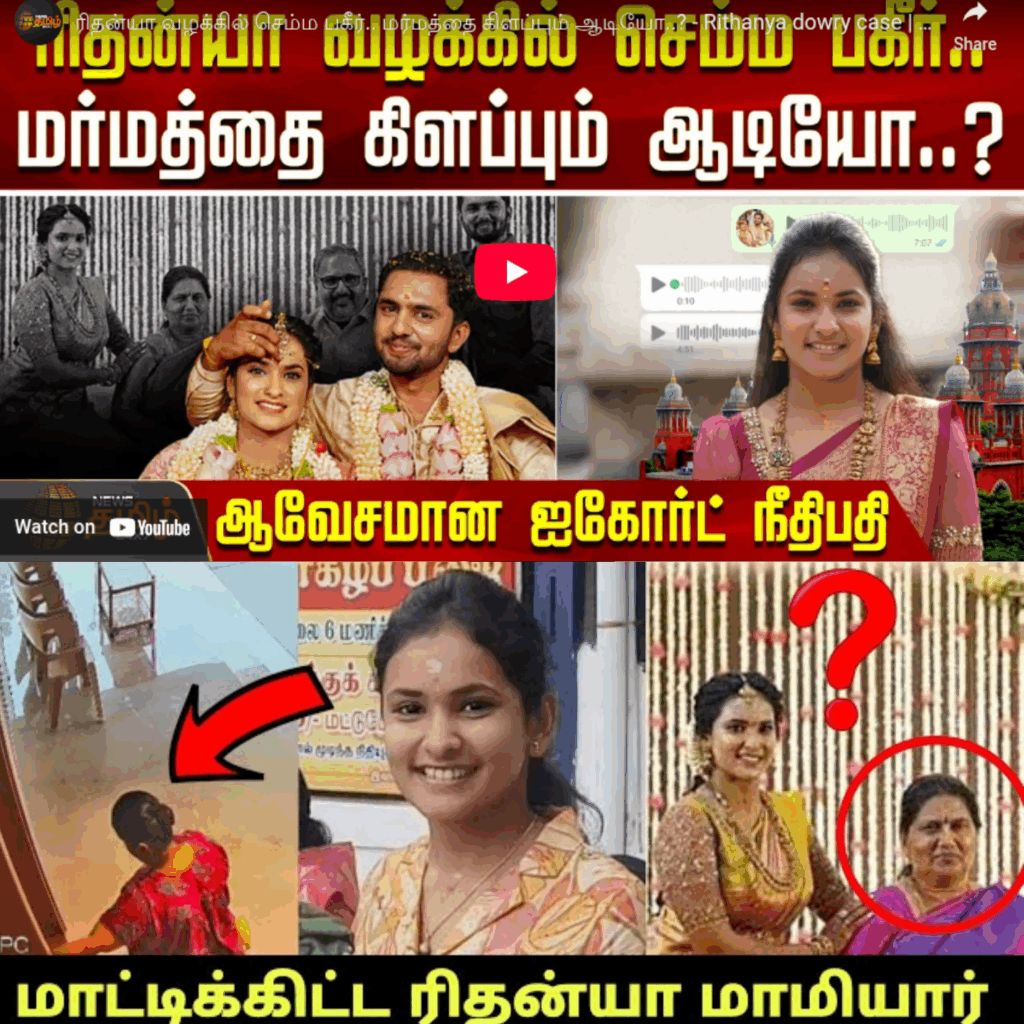Rithanya dowry case: The real culprit.. Mysterious audio..? – Rithanya dowry case | Tiruppur
.
.
.
In a case that has gripped the nation, the tragic story of Rithanya, a newlywed from Tiruppur, has raised serious questions about dowry practices and domestic violence in India. Rithanya reportedly took her own life under mysterious circumstances, leading to an investigation that has unveiled a web of allegations, arrests, and a haunting audio recording that may shed light on the events leading up to her death.
The Background of the Case
Rithanya, a young bride, was married to Kavin Kumar, a man whose family reportedly demanded a substantial dowry. This practice, which is illegal in India, continues to persist in many communities, often leading to severe consequences for women. Just weeks after her marriage, Rithanya was found dead, and her family alleged that she was subjected to harassment and abuse due to the dowry demands.
The initial investigation led to the arrest of Kavin Kumar, his maternal uncle, Eeswaramoorthy, and his mother, Chithra Devi. They were charged with abetment to suicide, a serious offense that carries significant penalties under Indian law. The case quickly attracted media attention, highlighting the ongoing issues surrounding dowry and domestic violence in India.
The Court Proceedings

As the case unfolded in the Chennai High Court, Judge M. Nirmal Kumar raised critical questions regarding the investigation. One of the key points of contention was the absence of evidence in the post-mortem report indicating physical abuse. The judge expressed concern over the lack of clarity regarding Rithanya’s condition prior to her death.
Furthermore, the judge inquired about the mysterious audio recording that had surfaced, which allegedly contained conversations related to Rithanya’s treatment by her in-laws. The existence of this recording has sparked speculation about its contents and potential implications for the ongoing investigation.
The Audio Recording: A Potential Key to the Mystery
The audio recording, which has not yet been made public, is believed to contain conversations that could provide insight into Rithanya’s mental state and the dynamics of her marriage. Legal experts suggest that if the recording reveals evidence of harassment or threats, it could significantly impact the case against Kavin Kumar and his family.
This development has intensified public interest in the case, with many calling for justice for Rithanya and greater awareness of the issues surrounding dowry and domestic violence. Social activists have been vocal in their demands for stricter enforcement of laws against dowry and better support systems for women facing abuse.
The Public Reaction
The case has ignited a firestorm of debate across social media platforms and news outlets. Many individuals have shared their own experiences with dowry-related violence, shedding light on the pervasive nature of this issue in Indian society. Hashtags advocating for justice for Rithanya have trended on platforms like Twitter and Instagram, reflecting a growing movement against dowry practices.
In Tiruppur, where the incident occurred, local residents have expressed shock and outrage. Many have gathered for candlelight vigils to honor Rithanya’s memory, calling for an end to dowry-related violence and a cultural shift towards valuing women as individuals rather than commodities.
The Legal Implications
As the investigation continues, legal experts are closely monitoring the developments in the case. The prosecution will need to establish a clear link between Rithanya’s death and the actions of her husband and in-laws. If the audio recording contains incriminating evidence, it could bolster the case against them significantly.
The case also raises broader questions about the effectiveness of existing laws against dowry and domestic violence in India. Despite legal prohibitions, many families continue to engage in these practices, often with little fear of repercussions. Activists argue that more needs to be done to educate communities about the dangers of dowry and to empower women to seek help when faced with abuse.
Moving Forward
As the legal proceedings unfold, the hope is that Rithanya’s story will serve as a catalyst for change. Advocates are urging lawmakers to strengthen existing legislation and to implement more robust support systems for women in abusive situations. The tragic loss of Rithanya should not be in vain; it must be a wake-up call for society to confront the deep-rooted issues of dowry and domestic violence.
In conclusion, the Rithanya dowry case is not just a legal matter; it is a reflection of societal attitudes towards women and the ongoing struggle against deeply entrenched cultural practices. As the investigation continues, the eyes of the nation are on Tiruppur, waiting for justice for Rithanya and hoping for a future where no woman has to endure the pain that she faced.
News
“तलाकशुदा पत्नी ने झूठे केस में “अपने ही पति को जेल भिजवा दिया… “फिर जो हुआ…
“तलाकशुदा पत्नी ने झूठे केस में “अपने ही पति को जेल भिजवा दिया… “फिर जो हुआ… कहते हैं हर चमकती…
जिसे सब सफाई कर्मचारी समझ रहे थे, वो निकला करोड़ों की कंपनी का मालिक! क्या…
जिसे सब सफाई कर्मचारी समझ रहे थे, वो निकला करोड़ों की कंपनी का मालिक! क्या… दानिश रायजादा, एक ऐसा नाम…
Flight में अरबपति की बच्ची रो रही थी, फिर गरीब लड़के ने जो किया – देखकर सब हैरान रह गए।
Flight में अरबपति की बच्ची रो रही थी, फिर गरीब लड़के ने जो किया – देखकर सब हैरान रह गए।…
30 डॉक्टर फेल हो गए, लेकिन एक गरीब लड़की ने करोड़पति की जान बचा ली!”
30 डॉक्टर फेल हो गए, लेकिन एक गरीब लड़की ने करोड़पति की जान बचा ली!” रात का वक्त था। मुंबई…
Tiger 3 Movie Actor Varinder Singh Ghuman Passed Away| Varinder Singh Ghuman Antim Sanskar
Tiger 3 Movie Actor Varinder Singh Ghuman Passed Away| Varinder Singh Ghuman Antim Sanskar . . Tiger 3 Actor Varinder…
Abhishek celebrated Karwa Chauth with his wife Aishwarya Rai and Shweta Bachchan, Amitabh Jaya also
Abhishek celebrated Karwa Chauth with his wife Aishwarya Rai and Shweta Bachchan, Amitabh Jaya also . . Abhishek Bachchan Celebrates…
End of content
No more pages to load

